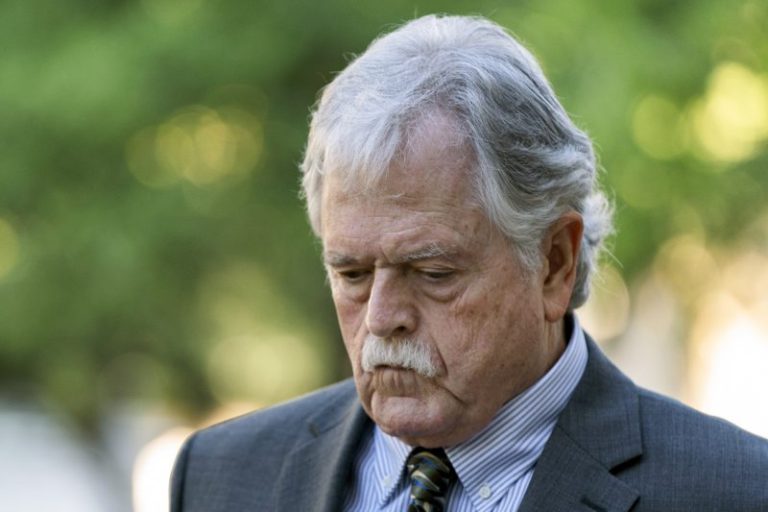As the trial of five Oath Keepers associates accused of conspiring to stop Joe Biden from taking office wound down, retired Navy intelligence officer Thomas Caldwell appeared to struggle with a problem all defendants have faced in court: trying to explain their references to violence related to the Jan. 6, 2021, U.S. Capitol attack as recorded on video and in text messages.
Caldwell, 68, called his past words “a great exaggeration, just like the charges against me.” He testified that a “militia” is just “neighbors helping neighbors.” And he said messages from him about taking out enemies with sniper fire or staging and transporting “heavy weapons” across the Potomac River by boat were “creative writing.”
Caldwell was one of two defendants to take the stand in the seventh week of the Oath Keepers seditious conspiracy trial in federal court in Washington. His testimony echoed Oath Keepers founder Stewart Rhodes’s earlier testimony and two others on trial who did not testify but offered friends and family to provide evidence that their sometimes graphic and inflammatory communications did not reflect their true intentions. A fifth defendant, Ohio militia leader Jessica Watkins, surprised the court by announcing plans to testify after lunch Wednesday.
Caldwell claimed he saw no violence at the Capitol and thought until days later reports of it were “hooey.” But in messages sent the evening of the attack, he talked about stealing riot shields, throwing fire extinguishers through windows and watching Proud Boys fight the police. “It was a great time,” he wrote.
What to know about the Oath Keepers sedition trial
1/2
End of carousel
Caldwell and his wife only made it as far as the inaugural scaffolding; like Rhodes, he did not enter the building. But prosecutors argue that both plotted with Oath Keepers co-defendants Kelly Meggs, Kenneth Harrelson and Jessica Watkins to attempt to keep Donald Trump in power by force.
Caldwell was not a formal member of the Oath Keepers but had become friendly with them after he met Rhodes at a pro-Trump Stop the Steal rally in Purcellville, Va., on Nov. 8, 2020, Caldwell and his wife, Sharon Caldwell, testified. For the pro-Trump Million MAGA March the following week in Washington, about 15 Oath Keepers camped at Caldwell’s farm in Berryville.
Watkins’s fiance testified that their militia was a small group that only joined forces with the Oath Keepers in late 2020, and that she wanted them “fighting fit” by Inauguration Day not to launch a coup but to protect themselves against possible “enforced vaccination” under President Biden and U.N. forces, or a Chinese invasion through Canada.
“There was talk of the Insurrection Act, but no one was taking it seriously. I would put it below the Chinese invading,” Watkins testified in explaining her texts to Oath Keepers after Jan. 6 about having a “bug-out” plan to retreat to the Kentucky hills to fight like the “NVA,” or North Vietnamese Army.
During cross-examination, prosecutors repeatedly pointed to comments showing a willingness by the defendants and their allies to engage in political violence following Rhodes’s calls to prepare for civil war and give their lives to overturn the 2020 presidential election.
What to know about the Oath Keepers sedition trial
1/2
End of carousel
Don Siekerman, a 69-year-old retired police officer and former Army medic, said he was unaware of any plan to enter the Capitol or stop the election certification. If he had been the Oath Keepers ground commander in Washington as planned on Jan. 6, he said, he would have “directed people away from the scene, not toward it”— but he got covid three days earlier.
Despite his gentle demeanor and slow delivery on the stand — which he attributed to covid fog — his text messages were fiery.
In a Nov. 6 Parler message, Siekerman called for “millions of American Patriots” with military training to be prepared for a looming “great confrontation,” writing, “There will be a cleansing of the freedom tree.”
“Cleansing the freedom tree means killing people, right?” prosecutor Louis J. Manzo asked.
“Yes, sir,” Siekerman replied.
“Stewart Rhodes says we’re in for a bloody civil war, and your reaction is, ‘I’m in?’”
“It appears so,” Siekerman said.
The defense struggled at times to present some evidence, after accusing prosecutors of muzzling its potential witnesses by criminally charging them. One Oath Keepers member described as Rhodes’s “battle buddy” on Jan. 6 invoked his Fifth Amendment right against self-incrimination in front of the jury. Another Oath Keepers board member and former vice president was outed as an FBI informant and did not appear, a leak that prosecutors wanted investigated.
One key defense witness testified despite facing Jan. 6 charges. Michael Greene, described as Siekerman’s successor as the Oath Keepers’s operations coordinator for Jan. 6, told jurors there was no conspiracy or plan to breach the Capitol or to use force in any way.
Rhodes’s discussion of civil war and call for Oath Keepers to be ready to lay down their lives to keep Trump in office was “nothing different than the old guy at the barbershop talking,” Greene said. The rioters, he said, were “a lot of old guys,” noting wryly, “I’m indicted with them.”
Watkins, unlike Caldwell or Rhodes, entered the Capitol. She said she wanted to apologize to police and to jurors for yelling “Push!” while part of a mob tried to break through police lines to reach the Senate chamber.
Watkins described herself as “gullible” and mad. She said she had been watching Alex Jones online Infowars show five hours a day and got “swept up” in the riot.
“I was in a lot of pain [from a December accident], pissed off that they stole the election, certified the election. And now I’m being crushed in a hallway, and they won’t even listen to me,” Watkins explained. “I reacted. It was stupid.”

